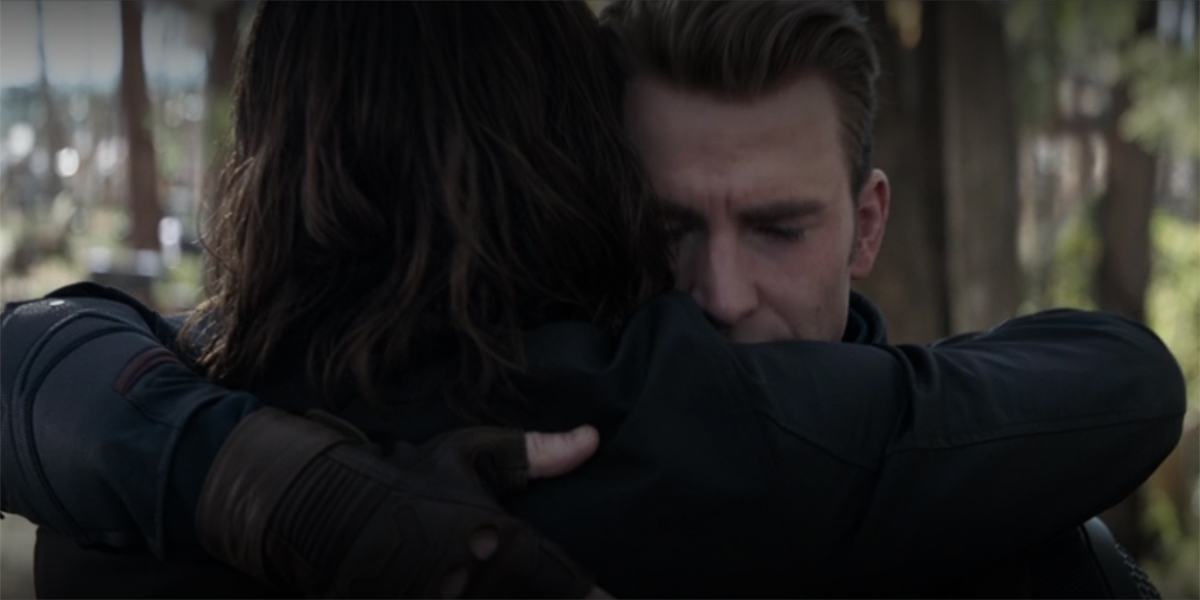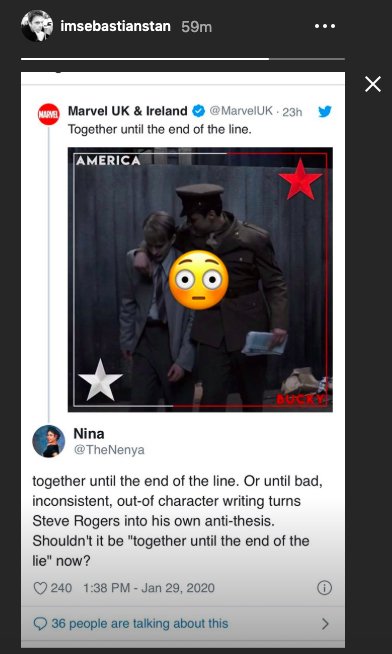Did Sebastian Stan Actually Criticize Captain America's Ending?

Last year, Marvel fans worldwide said goodbye to Chris Evans’ big screen incarnation of Steve Rogers a.k.a. Captain America, as the final sequence of Avengers: Endgame saw the legendary hero take a trip back in time so that he could live out his years with the love of his life, Hayley Atwell’s Peggy Carter. Many fans felt that this was a wonderful farewell to the character, providing him with a happy ending and a satisfying conclusion.
Those positive feelings are evidently not universal, however, as recently highlighted by Marvel star Sebastian Stan – who plays Steve Rogers’ best friend/sidekick Bucky Barnes.
The negative take on the final scenes of Avengers: Endgame seem to suggest that by going back in time to be with Peggy, Captain America not only betrays his own personal morals, but also a promise that the star-spangled hero made to his buddy several times throughout his life: “together until the end of the line.” This is the gist of the Tweet that Sebastian Stan recently highlighted on his personal Instagram account:

As you can see, the only editorial content provided by Sebastian Stan on the screenshot is a blushing emoji. The suggestion seems to be, “Whoops, maybe we didn’t think about that” – and that certainly seems to be the perception at large. The post wound up getting Stan’s name trending on Twitter, partially because the Marvel actor’s social media post was amplified by Star Wars star John Boyega (who isn’t really a stranger when it comes to questioning creative choices in his own movies).
This, naturally, raises a central debate: did Steve Rogers betray his morals and friendship to Bucky by going back in time? I’d personally argue that the answer is “no,” but it’s an interesting conflict to piece out.
One important argument not taken into consideration in what’s been covered above is the interaction that is featured between Captain America and Bucky right before the former goes on his time travel adventure. Hulk and Falcon believe that Steve is only going to be leaving for a moment, returning the Infinity Stones to their proper places and then coming back… but when you rewatch the scene, Bucky seems to know something that nobody else does. In addition to the two men sharing the same exchange they had before Bucky went off to war, the man formerly known as the Winter Soldier tells Steve that he is going to miss him.
The implication is that Bucky knows that Steve isn’t just going to immediately come back (as his young self, anyway), which suggests that he knew what his best friend was going to do, and accepts it. This is only further enforced by the nod of approval that Bucky gives to Falcon as he approaches Old Man Steve on the bench – acting as though he knew how things were going to play out. That hardly makes what Cap does a betrayal, either to his “end of the line” friend, or his ethics.
Your Daily Blend of Entertainment News
If you really want to pick a bone with Captain America’s actions at the end of Avengers: Endgame, the much more significant thing to target is the understanding of his life parallel to Bucky’s through the 20th century. He can’t do anything about it because he can’t screw with time, but Steve presumably lives his life through the 1950s, 1960s, 1970s, etc. knowing that his best friend is being used as a brainwashed tool for Hydra, assassinating key public figures (including Tony Stark’s parents).
Really, though, that’s just a small piece of a horrible moral puzzle, as you also have to consider things like “Captain America knows that 9/11 is going to happen, and can’t do anything to stop it.”
What’s your take on this? Did Captain America betray Bucky by deciding to live out his life with Peggy? Or was he justified in his actions? Hit the comments section with your thoughts, feelings, and opinions on the matter, and be sure to stay tuned for all kinds of news and updates here on CinemaBlend about Bucky’s life post-Steve Rogers, which will be extensively covered in the upcoming Disney+ series The Falcon And The Winter Soldier.

Eric Eisenberg is the Assistant Managing Editor at CinemaBlend. After graduating Boston University and earning a bachelor’s degree in journalism, he took a part-time job as a staff writer for CinemaBlend, and after six months was offered the opportunity to move to Los Angeles and take on a newly created West Coast Editor position. Over a decade later, he's continuing to advance his interests and expertise. In addition to conducting filmmaker interviews and contributing to the news and feature content of the site, Eric also oversees the Movie Reviews section, writes the the weekend box office report (published Sundays), and is the site's resident Stephen King expert. He has two King-related columns.
